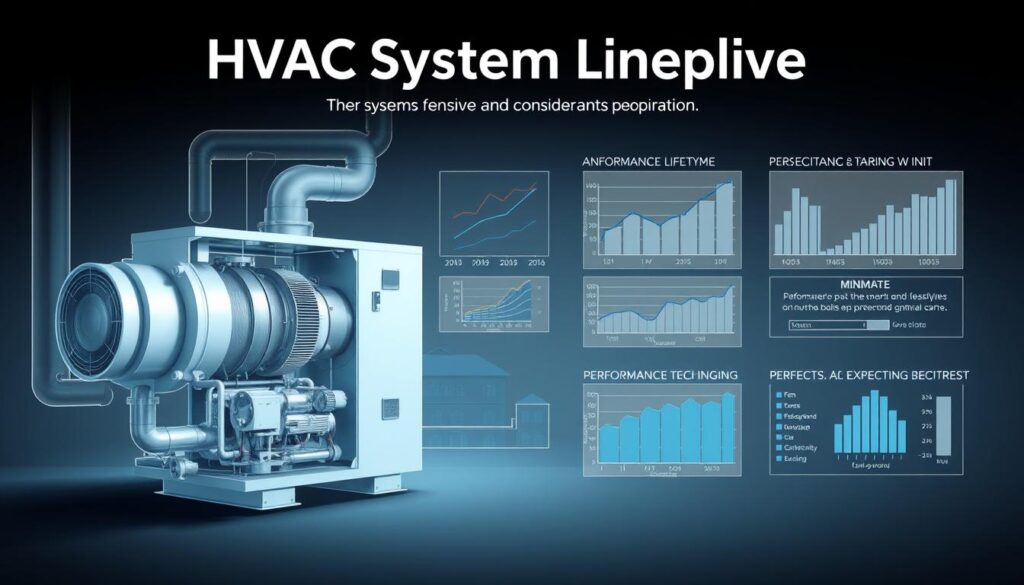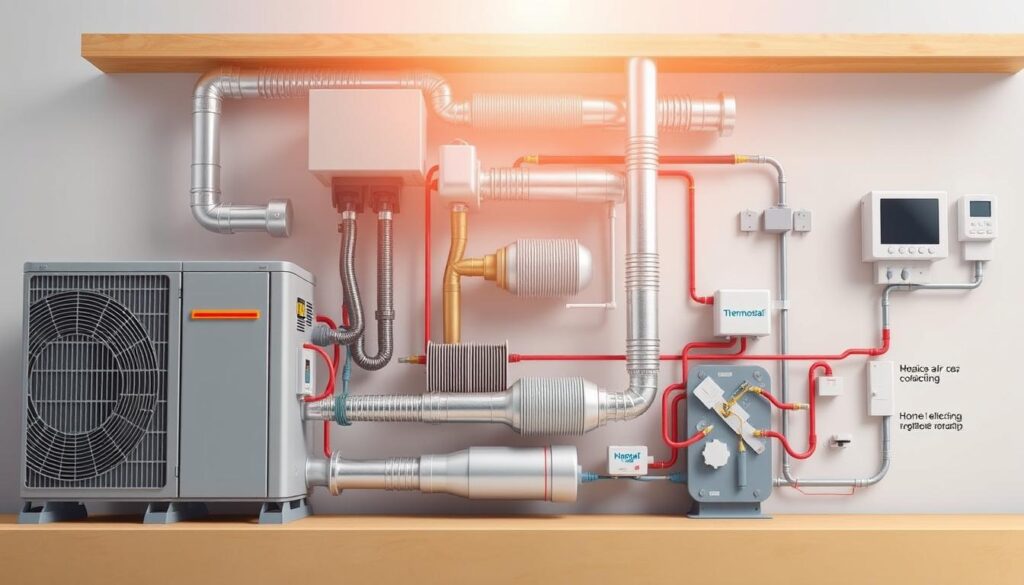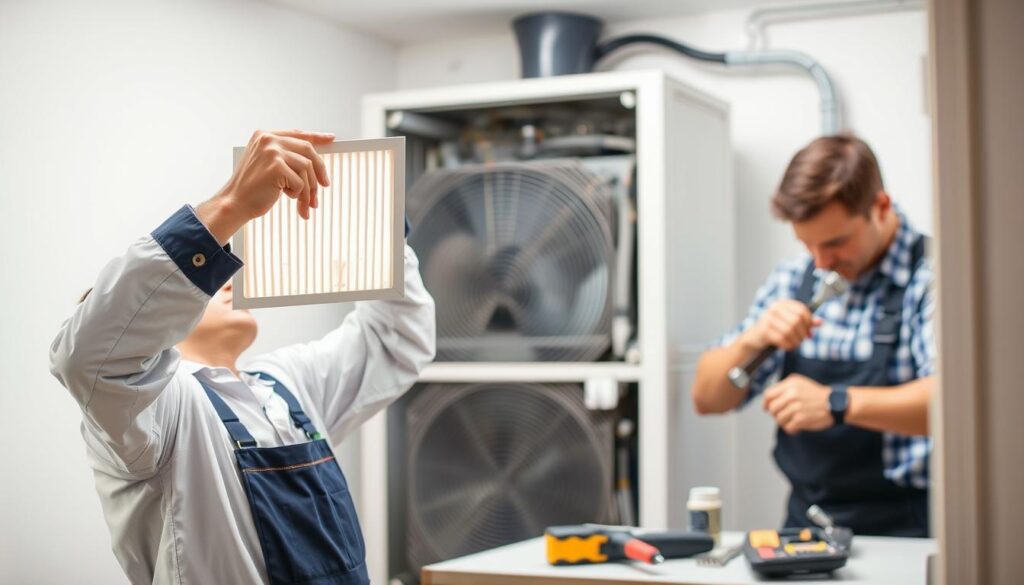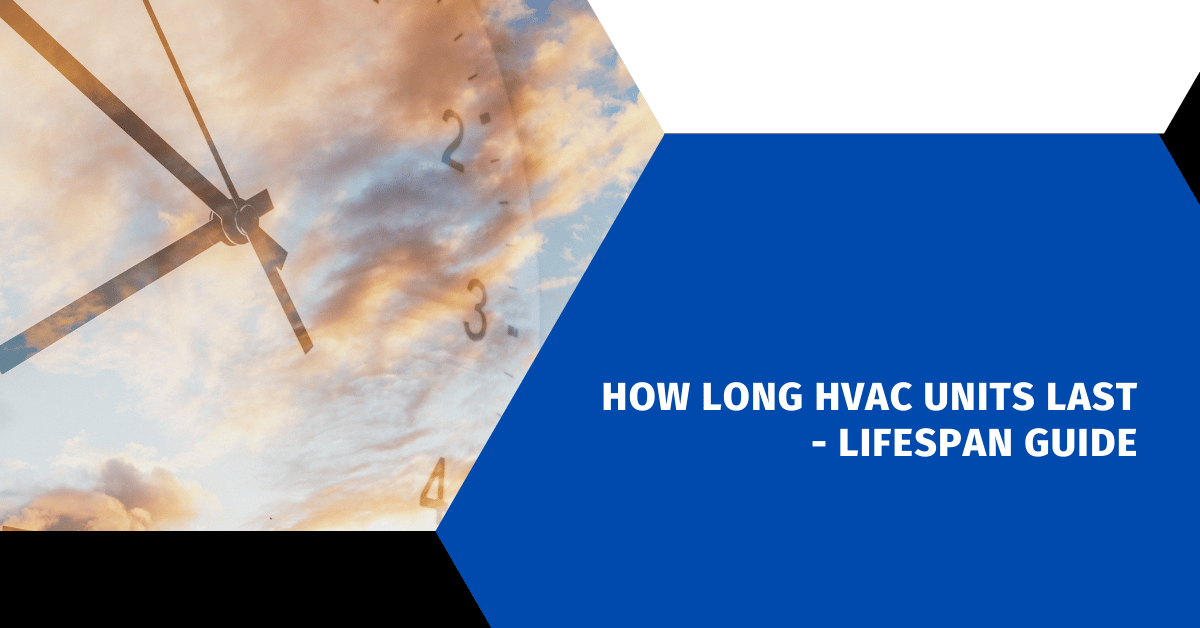How Long HVAC Units Last? Ever wondered how long your HVAC system will keep your home comfortable? It’s not just about numbers. It’s about keeping your home cozy and saving money.

The average HVAC system lasts 15 to 25 years. But, it depends on many things. Things like how well you maintain it and the weather can change its lifespan.
Knowing how long your HVAC units last helps you plan. It helps you budget and avoid sudden breakdowns. This way, you won’t have to deal with cold or hot weather when you least expect it.
Key Takeaways
- Most HVAC systems last between 15-25 years
- Regular maintenance significantly extends system life
- Different HVAC types have varying lifespans
- Environmental factors impact system durability
- Proper installation is key for longevity
Table of Contents
Understanding HVAC System Lifespans
Your HVAC system is key to your home’s comfort. Knowing how long it lasts and what affects its lifespan helps you plan for replacements and upkeep.
Different HVAC systems last for different times. Knowing this can help you make your system last longer and work better.
Average Lifespan by System Type
- Central Air Conditioning Units: 15-20 years
- Furnaces: 15-20 years (electric furnaces up to 40-50 years)
- Heat Pumps: 10-15 years
- Ground-Source Heat Pumps: Up to 30 years
Factors Affecting Equipment Duration
Several key factors affect how long your HVAC system lasts:
- Maintenance frequency
- Climate and environmental conditions
- Usage patterns
- Installation quality
- System type and brand
Common Life Expectancy Ranges
Most HVAC systems last between 15-25 years. Keeping them well-maintained can extend their life and save you money on early replacements.
“Proper maintenance is the key to maximizing your HVAC system’s lifespan and performance.”
Changing filters regularly, getting annual checks, and using your system wisely can extend its life.
Explore Our HVAC Shop
Looking for top-rated HVAC tools, parts, and accessories? Visit our shop and find the perfect solution for your needs.
Visit the ShopTypes of HVAC Systems and Their Durability
Knowing about the different HVAC systems is key to making them last longer. Each system has its own strengths and weaknesses. These can affect how comfortable your home is and how much energy it uses.
Here are the main HVAC system types you’ll find:
- Central Air Conditioning Systems
- Average lifespan: 10-15 years
- Best for cooling your whole home
- Heat Pump Systems
- Average lifespan: 10-15 years
- Works for both heating and cooling
- Furnace Systems
- Average lifespan: 15-20 years
- Great for steady heating
- Ductless Mini-Split Systems
- Average lifespan: 20+ years
- Flexible for zonal heating and cooling
Following HVAC maintenance tips is vital for better system performance. Regular upkeep can extend your HVAC unit’s life. It prevents wear and reduces stress on the system.
Proper care can make the difference between a system that lasts 10 years and one that performs efficiently for 20 years or more.
Several factors influence how long an HVAC system lasts. These include the quality of installation, the climate, how often you maintain it, and how you use it. Understanding these can help you choose the best heating and cooling systems for your home.
How Long HVAC Units Last: A Comprehensive Timeline
Knowing how long your HVAC system will last is key for upkeep and budgeting. Each part of the system has its own lifespan. This is influenced by how well you maintain it, how often you use it, and the technology it has.
Furnace Longevity: Built to Last
Gas furnaces are among the longest-lasting HVAC parts. With regular care, they can work well for 20 to 30 years. Several things affect how long they last:
- Regular professional maintenance
- Quality of initial installation
- How often you use it
- Local climate conditions
Air Conditioner Performance Expectations
Your air conditioner should cool your home well for 15 to 20 years. New, energy-saving models might last longer than older ones. But, living near the coast can shorten its life because of salt in the air.
Heat Pump Dynamics
Heat pumps are versatile and usually last from 10 to 20 years. Their lifespan depends on:
- How often you get it checked
- How well it was installed
- Your local climate
- Recent technology updates
“Regular maintenance can make your HVAC system last longer,” says an HVAC expert.
Explore Our HVAC Shop
Looking for top-rated HVAC tools, parts, and accessories? Visit our shop and find the perfect solution for your needs.
Visit the ShopKey Factors That Impact HVAC System Longevity

Your HVAC system’s lifespan depends on many important factors. Knowing these can help you make your system last longer and work better.
Several key factors greatly affect how long your HVAC unit will work well:
- Installation Quality: A good installation is key. Bad installation can cause more wear and less efficiency.
- Maintenance Practices: Regular maintenance stops early breakdowns.
- Usage Patterns: Using your system too much can make it wear out faster.
- Environmental Conditions: The climate and where you live also matter a lot.
Hvac maintenance tips say to tackle these factors early. For example, homes near the coast with lots of salt air might wear out faster than those inland.
“A well-maintained HVAC system can potentially extend its lifespan beyond the average 15-20 years.”
Important steps to keep your system running well include:
- Annual professional tune-ups
- Good home insulation
- The right system size
- Changing filters often
By understanding and using these tips, you can keep your HVAC system in top shape for many years.
Signs Your HVAC System Needs Replacement
Knowing when to replace your HVAC system can save you money and prevent unexpected breakdowns. Most signs of aging HVAC systems emerge gradually. This gives homeowners time to plan for a strategic hvac unit replacement.
Your HVAC system communicates its health through several critical indicators. Recognizing these signs early can help you make informed decisions about system upgrades.
Performance Issues to Watch
- Inconsistent room temperatures
- Weak airflow from vents
- Strange noises like banging or grinding
- Unusual odors when system runs
Rising Energy Bills Signal Trouble
A sudden spike in energy costs often reveals an aging HVAC system’s declining efficiency. Older units can increase energy consumption by up to 30%. This makes replacement more economical in the long run.
Frequency of Repairs
When repair costs start accumulating, it’s time to consider replacement. Frequent repairs can indicate that your system is nearing the end of its operational lifespan. If annual repair costs approach 50% of a new system’s price, replacement becomes the smarter financial choice.
Proactive replacement can prevent unexpected system failures and improve home comfort.
Homeowners should carefully evaluate their HVAC system’s performance. Track repair frequency, energy efficiency, and overall comfort levels. This will help make an informed replacement decision.
Explore Our HVAC Shop
Looking for top-rated HVAC tools, parts, and accessories? Visit our shop and find the perfect solution for your needs.
Visit the ShopThe Role of Maintenance in HVAC Lifespan

Keeping your HVAC system in good shape is key to making it last longer and work better. Regular checks can really help your system last longer. With the right care, your HVAC can last up to 20 years.
Following some simple maintenance tips can save you from expensive repairs and sudden breakdowns. Here are some important steps to keep your system running smoothly:
- Change air filters every 60-90 days
- Schedule professional tune-ups twice annually
- Clean air vents and ductwork regularly
- Check refrigerant levels
- Inspect electrical connections
How often you maintain your system affects its efficiency and lifespan. Ignoring regular maintenance can cause your system to fail early and use more energy. Experts say regular inspections can catch problems before they get worse.
By spending a little time and money on maintenance, you can save a lot of money in the long run. It also keeps your HVAC system running at its best for years to come.
Coastal vs Inland HVAC System Durability
Your HVAC system’s lifespan can change a lot based on where you live. Coastal and inland areas have different challenges that affect how long your HVAC system lasts.
Coastal areas are tough on HVAC systems. The salty air can make equipment wear out faster. This can cut down the system’s life to 7-12 years, compared to 15-20 years in inland areas.
Salt Air’s Destructive Impact
Saltwater can harm HVAC parts. Tiny salt particles can corrode metal, leading to:
- Fast metal corrosion
- Quick damage to electrical parts
- Less efficient system
- Early equipment failure
Regional Considerations for HVAC Durability
Different places have different challenges for HVAC systems. The weather is a big factor in how long equipment lasts.
| Region | Average HVAC Lifespan | Key Challenges |
|---|---|---|
| Coastal Areas | 7-12 years | Salt corrosion, high humidity |
| Inland Regions | 15-20 years | Temperature changes |
| Desert Regions | 10-15 years | Extreme heat, dust |
To make your HVAC system last longer, take care of it. Regular maintenance and using protective coatings can help. Also, choose equipment made for your local weather.
Explore Our HVAC Shop
Looking for top-rated HVAC tools, parts, and accessories? Visit our shop and find the perfect solution for your needs.
Visit the ShopEnergy Efficiency and Modern HVAC Systems
Modern energy-efficient HVAC units are changing how we think about home comfort and sustainability. These systems can cut energy use by up to 50% compared to older models. This makes them a great choice for homeowners wanting to save on utility bills and extend their HVAC unit’s life.
Looking into energy-efficient HVAC units offers many benefits:
- Significantly lower energy bills
- Reduced environmental impact
- Enhanced home comfort
- Longer system durability
New technologies have made HVAC systems better. Smart thermostats, advanced filters, and variable-speed compressors help extend HVAC unit life. These features boost performance and keep energy use low.
| HVAC System Type | Energy Efficiency | Estimated Lifespan |
|---|---|---|
| Central Air Conditioners | Up to 40% improvement | 15-20 years |
| Heat Pumps | Up to 50% improvement | 20-25 years |
| Ductless Mini-Splits | Up to 45% improvement | 15-20 years |
Choosing energy-efficient HVAC units is more than saving money right away. It’s a long-term plan for comfort, less environmental impact, and possibly higher property value. Remember, regular maintenance is key to getting the most out of these systems.
Cost Considerations: Repair vs Replace
Choosing between repairing or replacing your HVAC system is a big financial decision. It’s not just about the upfront cost. Smart homeowners think about long-term savings and value.
- Multiply the age of your HVAC unit by the repair cost
- If the total is over $5,000, replacing is usually better
- If it’s under $5,000, fixing might be the smarter choice
Investment Analysis Strategies
When looking at HVAC replacement, consider these financial points:
- Energy Efficiency Savings: New systems can cut energy use by over 35%
- Potential Tax Credits: Up to 30% off installation costs
- Long-term Property Value Boost
Financial Breakdown
A new HVAC system costs between $5,000 and $12,500. This might seem pricey. But think about these savings:
- Lower energy bills
- Less frequent repairs
- Better home comfort
- Possible incentives from utility companies
If your system is over 10-15 years old and needs lots of repairs, a new HVAC could save you money over time.
Explore Our HVAC Shop
Looking for top-rated HVAC tools, parts, and accessories? Visit our shop and find the perfect solution for your needs.
Visit the ShopEnvironmental Factors Affecting HVAC Longevity
Your HVAC system’s life depends a lot on the environment. Different factors play big roles in how long your HVAC lasts and how well it works.
Where you live and the weather can really affect your HVAC. Extreme temperatures, humidity, and air quality can make your system wear out faster and work less efficiently.
- Coastal regions expose HVAC units to salt air corrosion
- Desert environments create intense heat stress on equipment
- Humid areas increase moisture-related component degradation
Some environmental challenges can really shorten your HVAC’s life. Extreme weather can make your unit last 10% to 25% less.
| Environmental Factor | Potential Impact on HVAC Lifespan |
|---|---|
| High Humidity | Increases corrosion risk by 15-20% |
| Extreme Temperatures | Reduces system efficiency by 10-15% |
| Poor Air Quality | Accelerates filter and component wear |
To protect your HVAC from environmental stress, you need a plan. Proper installation, regular maintenance, and choosing the right equipment for your area can help prevent damage.
Here are some protective steps to consider:
- Installing protective covers in coastal areas
- Using high-quality air filtration systems
- Scheduling professional environmental assessments
“Understanding your local environmental challenges is key to maximizing HVAC system longevity.” – HVAC Professionals Association
Professional Installation and System Lifespan
Professional installation is key to making your HVAC unit last longer. Skilled technicians know how to place, size, and integrate systems correctly. This leads to better performance, less energy use, and fewer breakdowns.
Start your HVAC maintenance by choosing a qualified team. Studies show that right installation can make your air conditioning last 12 to 15 years and your furnace up to 20 years. A good team will work carefully and explain everything, boosting your system’s efficiency.
Customer stories show the value of professional help. For example, a Lennox installation reduced gas use and made homes more comfortable. Quality installation means your HVAC system will work well for years.
Professional installation is more than just setting up your system. Look for technicians who provide detailed explanations, warranty support, and maintenance tips. Investing in professional installation means years of efficient home climate control.

